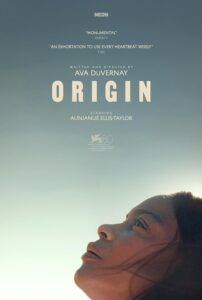A Cinematic Journey into Isabel Wilkerson’s ‘Caste’
Writer / Andy Ray
In 2020, Pulitzer Prize winning author Isabel Wilkerson published “Caste: The Origins of Our Discontents,” in which she argues that American slavery is a function of a caste system rather than pure racism. Now, filmmaker Ava DuVernay (“Selma”) has brought “Origin” to the big screen. But this is not an adapted screenplay; after all, Wilkerson’s is a work of non-fiction. Rather, “Origin” is an account of Wilkerson’s research, coalesced with concurrent stages of her personal life, which serve as inspiration for her writing.
brought “Origin” to the big screen. But this is not an adapted screenplay; after all, Wilkerson’s is a work of non-fiction. Rather, “Origin” is an account of Wilkerson’s research, coalesced with concurrent stages of her personal life, which serve as inspiration for her writing.
Approached by a colleague in 2012 to write a journalistic piece on the recent killing of Trayvon Martin, Wilkerson (brilliantly played by Aunjanue Ellis-Taylor, from “The Birth of a Nation” and “King Richard”) declines, but then sets out to write a book about the supposed racism responsible for Martin’s death. What transpires is a journey which leads her to Germany and India, to study their systems of social stratification.
In a meeting in Berlin, a German professor (Connie Nielsen) explains to Wilkerson that she believes Nazi Germany’s systematic slaughter of the Jewish race was more egregious than that of American slaves, because (a) the slaves were typically not killed, and (b) the system of slavery was designed as a pillar of capitalism – that slaves were used in service of capitalistic ends, rather than slain for no other reason than their race.
Perhaps taking an unpopular viewpoint among her fellow African American scholars, Wilkerson then develops her thesis that slavery – like Nazi Germany or the Indian Dalits – is based on caste, or social class hierarchy, rather than racism. To wit, German Jews are (primarily) as white as non-Jewish Germans; and Indian Dalits are as brown as Indians of other social classes. American slavery is another example of a caste system, argues Wilkerson.
As she interviews colleagues and friends, she experiences several tragedies in her personal life, including the declining health of her mother (Emily Yancy), and the sudden death of her husband (Jon Bernthal). DuVernay expertly layers Wilkerson’s present-day research work with flashbacks of happy times with her loving mother and her white, seemingly color-blind husband. It is implied, though fortunately never stated, that Wilkerson’s thesis is based, in part, on her very successful interracial marital relationship.
Intertwined with both these cinematic efforts (present-day work and past-tense family), DuVernay weaves in the story of a young German Nazi (Finn Wittrock) who falls in love with a Jewish girl (Victoria Pedretti), and two American couples (one white, one black) who move to the Civil Rights era South to research the plight of African Americans. As you can surmise, DuVernay juggles a lot of proverbial balls in “Origin,” which is a set-up for a confused mess of a film. Suffice to say DuVernay pulls it off magnificently. The result is nothing short of this year’s best film.
The fact that we don’t need to be scholars, nor necessarily have foreknowledge of the cited caste systems – How many of us are inherently familiar with Indian societal structure? – is a testament to the sublime genius of not only DuVernay’s direction, but her original screenplay. DuVernay has been a fine director for some time, but with “Origin,” she propels herself into the upper echelon of her peers. This is a film which will touch every race and every nationality.
And coupled with Cord Jefferson’s recent comedy-drama “American Fiction,” two recent studio releases made by black filmmakers dispel current thought regarding the victimization of African Americans. “American Fiction” would have us believe black readers are hungry for “real” literature by black authors, as opposed to “street” literature which plays directly into the stereotype of African Americans as societal victims. Now, “Origin” dismisses current thinking of slavery as innately racist, and casts the institution as a mainstay of a system of social class.
It’s great to see black filmmakers wrestling with views thrust upon them by politicians and journalists. Any time a filmmaker can make us think outside the box, I am enthralled. I enjoy “going along for the ride” of experiencing scholarly thought that may not align with my (or society’s) current thinking. How refreshing it is to experience “Origin,” a true work of originality and consequence.





